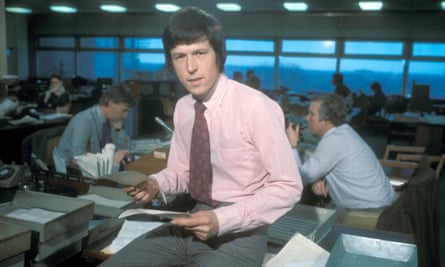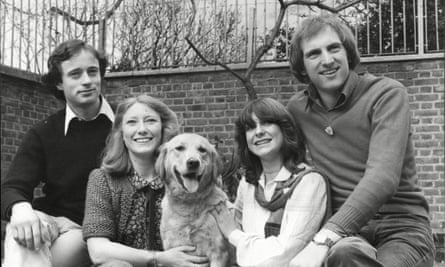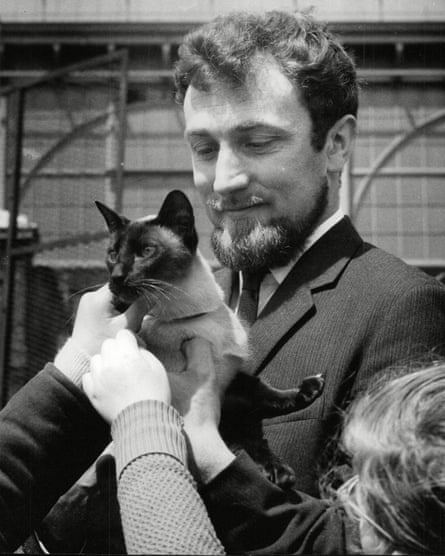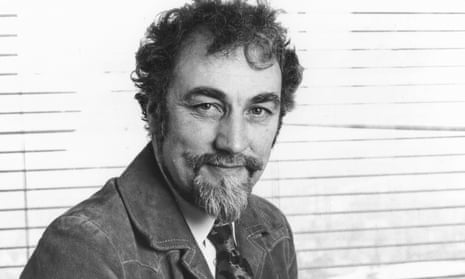Edward Barnes’s greatest innovation, before he became head of BBC television children’s programmes from 1978 until 1986, lay in creating Newsround. He launched the news programme for young viewers in 1972, after discovering that only 0.7% of his target age group watched TV news: “It was a man in a suit, talking, and it was boring,” he said.
He put John Craven, dressed casually in a sweater, in the presenter’s chair, initially for a six-week experiment, and the programme went on to become a BBC institution, even breaking major international news stories such as the disintegration of the space shuttle Challenger in 1986.
Barnes, who has died aged 92 after contracting Covid-19, also made a significant, long-lasting contribution as one of those who might be described as a godparent to Blue Peter, which was launched in 1958. He was an occasional floor manager during the show’s first four years as it sailed choppy waters with the departure of two presenters and its original producer. Caretaker producers tried to steady the ship while the search went on for a permanent replacement in 1962.
Barnes, then working on other BBC programmes as a production assistant, was turned down for the role. Biddy Baxter, who landed the job, had to serve three months’ notice in her BBC radio producer’s job, and fought off a suggestion that Barnes should produce Blue Peter until her arrival, concerned that he would not want to give way to “a girl from radio”. Instead, Leonard Chase assumed the temporary role, with Barnes assisting him, and hired Valerie Singleton to present alongside Christopher Trace.

When Baxter took over, Barnes continued as assistant producer and directed the programme. His and Baxter’s wariness of each other evaporated and together – with Rosemary Gill as researcher – they moulded Blue Peter into a programme that became essential viewing for children.
Baxter saw the involvement of viewers as the key to this, introducing “makes” – items created out of household materials – and annual appeals, and encouraging children to write in with ideas and stories by rewarding them with the famous Blue Peter badge. Barnes thought the programme should have its own distinctive logo, so Tony Hart was commissioned to design the galleon emblem, which featured on the badge.
The idea of having a Blue Peter pet came from Barnes’s wife, Dorothy, who scripted picture stories and other items for the show. Unfortunately, the mongrel chosen and introduced to viewers just before Christmas 1962 died of distemper two days later.

“We’ll have to get a substitute,” said Barnes. “The puppy’s only been seen once. There’s no point in upsetting children needlessly.” In freezing snow, he and Baxter drove around London pet shops in his Mini and found a lookalike in Lewisham. Viewers voted to name her Petra, the female form of Peter, and she became the first in a long line of Blue Peter pets.
In 1964, the show increased from one to two episodes a week and added John Noakes alongside Trace and Singleton. The following year, when Baxter was made the show’s editor – a new title – Barnes and Gill became producers. Barnes was a great defender of his boss, who held an authoritarian grip on the show. He insisted that if, in her quest for perfection, she was ruthless, it was “on behalf of the audience”.
Together, they also staged a fightback when, in 1964, BBC television’s children’s department lost its autonomy, and a new “family department” was formed out of children’s and women’s programmes. “We felt betrayed by the BBC,” said Barnes, “and we thought, ‘We’ll show them.’ We wanted to give the management a black eye.” Blue Peter and Play School were at the forefront of the battle and the children’s department was restored three years later.
Maintaining his association with the show after leaving to become the BBC’s assistant head of children’s programmes (1970-78), Barnes produced Blue Peter Royal Safari (1971), with Singleton accompanying Princess Anne on a tour of Kenyan wildlife parks. He also created and produced Blue Peter Special Assignment (1973-81), featuring trips to cities, islands, houses and rivers, initially as a vehicle for Singleton after she left the programme.
As deputy to Monica Sims, he created Record Breakers (1972-2001) and Go With Noakes (1976-80) and ruffled some establishment feathers by commissioning Grange Hill (1978-2008), the soap producer Phil Redmond’s warts-and-all drama about life in a comprehensive school. Other shows he oversaw or commissioned after taking over from Sims in 1978 included Rentaghost (1976-84), Multi-Coloured Swap Shop (1976-82), Think Again (1981-85), with Johnny Ball, Grandad (1979-84), starring Clive Dunn, Postman Pat (1981-96) and Henry’s Cat (1983-93).

In 1985, after Grange Hill had covered such issues as bullying, pregnancy and shoplifting, he endorsed a storyline about a pupil addicted to heroin, saying: “We have a responsibility to our audience to warn them about the danger of hard drugs.” Barnes also negotiated the rights to The Chronicles of Narnia (1988-90).
He was born in Wigan, Lancashire (now part of Greater Manchester), to Mabel (nee Latham), a nurse and midwife, and Hubert Barnes, the music critic of the Wigan Observer and an amateur actor. He left school at 14 and, after acting in repertory theatre, he was an announcer with the British Forces Network in Vienna (1946-49), then a stage manager in theatres, still acting occasionally.
He appeared on BBC television in The Passing Show: Our Marie (1953), a biopic of the music-hall star Marie Lloyd, and played Melchior in Away in a Manger, a 1954 children’s nativity. He then joined the BBC as an assistant floor manager in 1955, when he also briefly presented the Light Programme radio show Housewives’ Choice.
Following his early retirement in 1986, Barnes returned to programme-making, producing Treasure Houses (1987) and directing All Our Children (1990).
He and Baxter wrote the book Blue Peter: The Inside Story, published in 1989.
Dorothy (nee Smith), whom Barnes married in 1950, died in 1992. He is survived by their son, Simon, and two daughters, Rachel and Julia.
Anthony Hayward
Jeremy Swan writes: Monica Sims was a hard act to follow as head of BBC children’s programmes. But Edward Barnes was more than capable – his early years as the stage manager at the Pigalle Club in London had prepared him for anything. Heads of departments in television had to be great encouragers; they were continually nurturing the creative talents of workers whose temperaments were often eccentric.
Edward was an excellent head of children’s programmes. He instigated and encouraged shows that he knew would be good for the audience and he administrated with wisdom and humour. His office in BBC Television Centre’s East Tower was dominated by a large palm tree and a big poster for the Penang railway. He was very attached to the far east.
His home life was as creative as his job. His wife, Dorothy, was a writer and his children were talented in journalistic and literary fields. Edward effected a cheerful Mephistophelean appearance – his beard, fedora hats and flowing scarves all adding to his impresario persona.
He relinquished his post in 1986 and was succeeded by Anna Home, for whom he worked as a producer, a role he filled with panache and gusto.

Comments (…)
Sign in or create your Guardian account to join the discussion